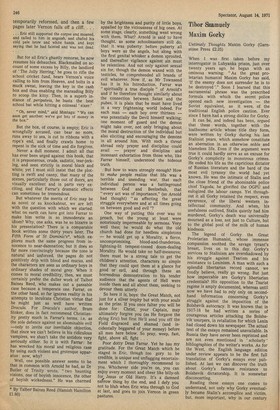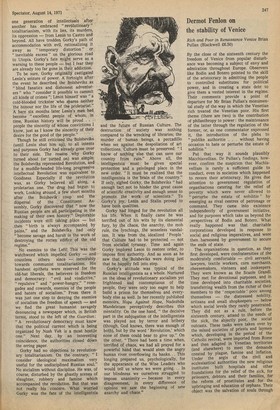Tibor Szamuely Maxim Gorky
Untimely Thoughts Maxim Gorky (Garnstone Press £2.25) When I was first taken before my interrogator in Lubyanka prison, just over twenty years ago, he began with an ominous warning: "As the great proletarian humanist Maxim Gorky has said, *If the enemy does not surrender he is to be destroyed '." Soon I learned that this sacramental phrase was the prescribed formula with which the secret police opened each new investigation — the Soviet equivalent, as it were, of the traditional English police caution. Ever since I have had a strong dislike for Gorky.
It can be, and indeed has been, argued that these words, together with the loathsome article whose title they form, were written by Gorky during his last Stalinist years, which somehow constitute an aberration in an otherwise noble and blameless life. Even if the argument were true it could hardly serve as an excuse for Gorky's complicity in monstrous crimes. He ended his life as the capricious dictator of Russian literature and the bard of the most evil tyranny the world had yet known. He was the intimate of Stalin and the close friend of the abominable police chief Yagoda; he glorified the OGPU and eulogized the labour camps. Yet throughout it all Gorky retained the respect, even reverence, of the liberal western intellectual community. And when, his usefulness outlived, Stalin quietly had him murdered, Gorky's death was universally mourned as a loss, not just to Culture, but to the global pool of the milk of human kindness.
The legend of Gorky the Great Proletarian Humanist, whose immense compassion soothed the savage tyrant's breast, lives on to this day. Gorky's services to Stalinism are overshadowed by his struggle against Tsarism and his resistance to Leninism. A man with such a splendid libertarian record cannot, we fondly believe, really go wrong. But just how impeccable are Gorky's libertarian credentials? His opposition to the Tsarist regime is amply documented, whereas until now we have had to rely only on secondhand information concerning Gorky's struggle against the imposition of the Bolshevik autocracy. It was known that in 1917-18 he had written a series of courageous articles attacking the Bolshevik usurpers, in retaliation for which Lenin had closed down his newspaper. The actual text of the essays remained unavailable. In Russia they have never been reprinted and are not even mentioned in 'scholarly' bibliographies of the writer's works. As for the West, the English language edition under review appears to be the first full translation of Gorky's essays ever published. At last we can discover the truth about Gorky's famous resistance to Bolshevik dictatorship. It is somewhat disconcerting.
Reading these essays one comes to understand, not only why Gorky eventually became Stalin's accomplice and victim, but, more important, why in our century one generation of intellectuals •after another has embraced " revolutionary " totalitarianism, with its lies, its murders, its oppression — from Lenin to Castro and beyond. All have trodden Gorky's path of accommodation with evil, rationalizing it away as "temporary distortion" or "inevitable excess" on the glorious road to Utopia. Gorky's fate might serve as a warning to these people -but I fear they are already too far gone in their addiction.
To be sure, Gorky originally castigated Lenin's seizure of power. A fortnight after the event he described the Bolsheviks as "blind fanatics and dishonest adventurers " who "consider it possible to commit all kinds of crimes "; Lenin himself was " a cold-blooded trickster who spares neither the honour nor the life of the proletariat." A bare six months later Lenin's men had become "excellent people of whom, in time, Russian history will be proud . . . people the sincerity of whose convictions I know, just as I know the sincerity of their desire for the good of the people."
Though he still criticised the Bolsheviks (until Lenin shut him up), to all intents and purposes Gorky had already gone over to their side. The reason why Gorky turned about (or turned on) was simple: the Bolsheviks represented Revolution, and for a muddle-headed life-long progressive intellectual Revolution was equivalent to Goodness. Especially if the revolution was, as Gorky believed all along, a proletarian one. The drug had begun to work. Looking around, a few short months after the Bolshevik coup and the dispersal of the Constituent Assembly, Gorky discovered that " now the Russian people are all participating in the making of their own history." Deplorable incidents were still taking place — but then "birth is always accompanied by pains," and the Bolsheviks had only "become savage and harsh in the work of destroying the rotten edifice of the old regime."
No enemies to the Left! This was the watchword which impelled Gorky — and countless others since — inexorably towards communist totalitarianism. His harshest epithets were reserved for the old-hat liberals, the believers in freedom and democracy : "evil and vindictive," " repulsive" and "power-hungry," "renegades and cowards, enemies of the people and haters of socialism." From there it was just one step to denying the enemies of socialism the freedom of speech — and we find the great humanist savagely denouncing a newspaper which, in British terms, stood to the left of the Guardian: "A revolutionary democracy must know that the political current which is being organized by Nash Vek is a most hostile one." Next day, by an interesting coincidence, the authorities closed down the erring paper.
Gorky had no objections to revolutionary totalitarianism. On the contrary, " consider ideological maximalism very useful for the undisciplined Russian soul." No socialism without discipline. He was, of course, disturbed by the ghastly scenes of slaughter, robbery and famine which accompanied the revolution. But that was not really his concern. What worried Gorky was the fate of the intelligentsia and the future of Russian Culture. The destruction of society was nothing compared to the wrecking of libraries; the murder of human beings, a peccadillo when set against the despoliation of art 'collections. Culture must be preserved: "I know of nothing else that can save our country from ruin." Above all, the intelligentsia must be given special protection and a privileged place in the new order. "It must be realized that the intelligentsia is the brain of the country." If only, sighed Gorky, the Bolsheviks "had enough tact not to hinder the great cause of scientific creativity and enough sense to promote the work of scientists." To Gorky's joy, Lenin and Stalin proved to have both qualities.
Gorky had longed for the revolution all his life. When it finally came he was terrified out of his wits by its elemental fury, by the chaos, the anarchy, the mob rule, the lynchings, the senseless vandalism. It was from the idealized ' People ' that Culture had to be protected — not from socialist tyranny. Time and again Gorky implored Lenin to restore order, to impose firm authority. And as soon as he saw that the Bolsheviks were doing just that he happily fell into step.
Gorky's attitude was typical of the Russian intelligentsia as a whole. Nurtured on the ideas of revolutionary socialism yet frightened and contemptuous of the people, they were only too eager to help build a prison for themselves and everybody else as well. In her recently published memoirs, Hope Against Hope, Nadezhda Mandelstam perceptively describes this mentality. On the one hand, "the decisive part in the subjugation of the intelligentsia was played not by terror and bribery (though, God knows, there was enough of both), but by the word 'Revolution,' which none of them could bear to give up." On the other, "There had been a time when, terrified of chaos, we had all prayed for a powerful hand that would stem the angry human river overflowing its banks... This longing prepared us, psychologically, for the appearance of the Wise Leaders who would tell us where we were going. .. In our blindness we ourselves struggled to impose unanimity — because in every disagreement, in every difference of opinion we saw the beginning of new anarchy and chaos."



































 Previous page
Previous page